八年级上英语导学案全
- 格式:doc
- 大小:415.50 KB
- 文档页数:82

新人教版八年级英语上册精品导学案全册合集(含同步习题及答案)Unit1 Where did you go on vacation?第1课时Section A (1a-2c)知识目标1. 口、笔头掌握以下句型-Where did you go on vacation? -I went to the mountains.-Where did Tina go on vacation? -She went to the mountains.-Did you go with anyone? -Yes, I went with my mother.2.熟练掌握以下词汇:vacation, mountain, special, anyone技能目标:复习并掌握动词一般过去式的构成规律; 能用一般过去式叙述假期所做的事。
通过对过去事情的谈论,增进同学的相互了解。
1. 你能用英语写出下列短语吗?呆在家里_________ 去纽约市_________ 拜访我的叔叔_________去夏令营_________ 去爬山_________ 去海滩_________参观博物馆_________ 买特别的东西_________ 遇见有趣的的人_________做有趣的事情_________II. 回忆并默写出规则动词过去式的变化规则:1.______________2. ______________3. ______________4. ______________III. 做调查,问问你的同伴上个暑假都去了哪儿?Before listening1. 小组内交流课前准备1中的短语,并大声朗读三遍2. 两人一组,用课前准备III的内容对话。
3. Do 1a.观察与复习:1a 中用的动词是______时态。
规则动词过去式的变化规则是:(课前准备II)______________________练习:写出下列动词的过去式While listening1. 1b listen twice and number the people in the picture.2. 1c Pairwork. Make conversations about the people in the picture.3. 2a Listen twice and complete the chart.4. 2b Listen twice again and check Yes or No for each question.5. 模仿秀:听录音中的重点句段,反复跟读,模仿语音语调。
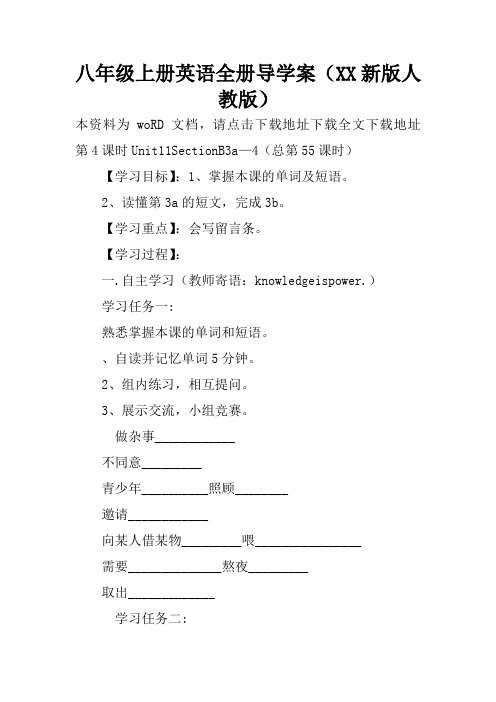
八年级上册英语全册导学案(XX新版人教版)本资料为woRD文档,请点击下载地址下载全文下载地址第4课时Unit11SectionB3a—4(总第55课时)【学习目标】:1、掌握本课的单词及短语。
2、读懂第3a的短文,完成3b。
【学习重点】:会写留言条。
【学习过程】:一.自主学习(教师寄语:knowledgeispower.)学习任务一:熟悉掌握本课的单词和短语。
、自读并记忆单词5分钟。
2、组内练习,相互提问。
3、展示交流,小组竞赛。
做杂事____________不同意_________青少年__________照顾________邀请____________向某人借某物_________喂________________需要______________熬夜_________取出_____________学习任务二:读懂3a短文,完成题目要求。
、小组讨论短文意思。
2、全班交流,教师点拨。
3、阅读3b小短文,完成第二部分。
4、组内交流,核对答案。
5、全班交流,教师点拨,背诵短文并展示。
Thanksfor+n./v-ingTakecareof=____________________ Takegoodcareof=_______________________ Givesb.sth.=givesth.Tosb.Feed…with/on…Feed…to…PlaywithForgettodosth.Forgetdoingsth.翻译:1)谢谢你来看我。
2)我不在时,请你照顾好自己。
3)睡觉前别忘了关灯。
4)我忘关窗户了。
5)吹喇叭打排球和小狗玩放这首曲子改同义句)Pleasegivemesomebananas.Please________somebananas_______________.2)mymotheraskedmetofeedgrasstothecow.3)mymotheraskedme________________thecow-___________grass..学习任务三:会用礼貌的语言表达对别人的请求,会写邀请信或留言条等作文:假如你是Sandy,你和你的父母准备去度假,请你给你的最好的朋友Rose留个便条,请她帮你照看你的兔子。

Unit 1 Where did you go on vacation? 导学案Section A 1a—2c第1课时【学习目标】:1. Talk about past events2. To learn to use where questions and answers【学习重点】:学会用一般过去时态描述曾经度过的假日。
【学习过程】:1. 知识链接:1). 复习一般过去时态的意义与结构。
2). 掌握一些规则的和不规则动词的过去式。
2. 自主学习(教师寄语:Many hands make light work. )1) 要求学生小组讨论自己刚刚过去的暑假。
并写下用到的句型:____________________________________________________________________________ ____________________________________________________________________________ _______________________________2) 利用素材练习以上句型。
3)认读短语并将单词与图画匹配.4)小组活动Example: A: Where did Tina go on vacation?B: She went to the mountains.3. 听力练习1)Listen. Where did the people go on vacation? Complete the chart.People PlacesGraceKevinJulie2)Listen again. Check(√)Yes, I did or (×)No, I didn't for each question.4. 巩固练习According to the listening, and role-play the conversations between Grace, Kevin and Julie.Example: A: Grace, where did you go on vacation?B: I went to New York City.A: Oh, really? Did you go with anyone?B: Yes, I went with my mother.课后作业Show us your vacation. Whose vacation is the best(最棒)?【学习小结】(教师寄语:No man can do two things at once.)1. 总结一下本课时学到的动词短语。
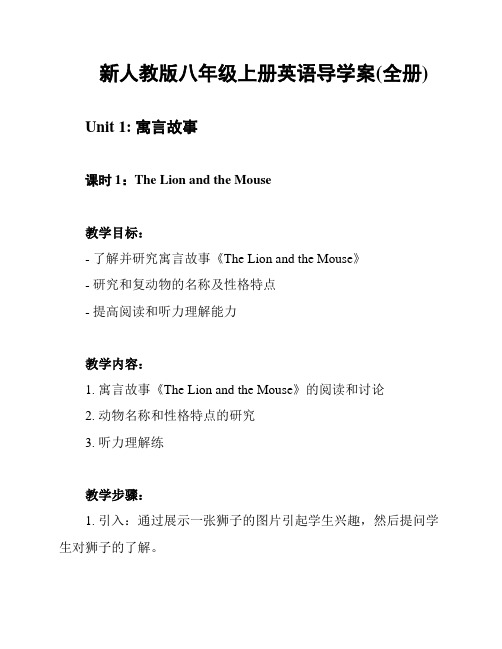
新人教版八年级上册英语导学案(全册) Unit 1: 寓言故事课时1:The Lion and the Mouse教学目标:- 了解并研究寓言故事《The Lion and the Mouse》- 研究和复动物的名称及性格特点- 提高阅读和听力理解能力教学内容:1. 寓言故事《The Lion and the Mouse》的阅读和讨论2. 动物名称和性格特点的研究3. 听力理解练教学步骤:1. 引入:通过展示一张狮子的图片引起学生兴趣,然后提问学生对狮子的了解。
2. 阅读故事:带领学生阅读寓言故事《The Lion and the Mouse》并注重理解故事情节。
3. 讨论问题:让学生回答关于故事的问题,例如:What did the lion do to the mouse? Why did the lion spare the mouse?4. 研究动物名称和性格特点:教授单词lion、mouse等动物名称,并让学生描述它们的性格特点。
5. 听力理解练:播放与故事相关的听力材料,要求学生听并回答问题。
作业:1. 抄写故事《The Lion and the Mouse》的关键句子。
2. 阅读课本上关于动物名称和性格特点的内容并做笔记。
Unit 2: 基础篮球技巧课时1:Dribbling教学目标:- 研究和掌握篮球运球的基本技巧- 提高身体的协调能力和手眼协调能力- 培养团队合作意识和体育精神教学内容:1. 篮球运球技巧的演示和解释2. 练篮球运球的基本动作3. 小组合作练教学步骤:1. 引入:向学生展示篮球运球的动作,并解释其重要性和应用场景。
2. 演示和解释:仔细演示篮球运球的基本技巧并解释每个动作的要点。
3. 练动作:让学生跟随教师一起练篮球运球的基本动作。
4. 小组合作练:将学生分成小组,进行篮球运球的练。
每个小组轮流进行练,其他组员观察并给予反馈。
作业:1. 回顾并练篮球运球的基本动作。


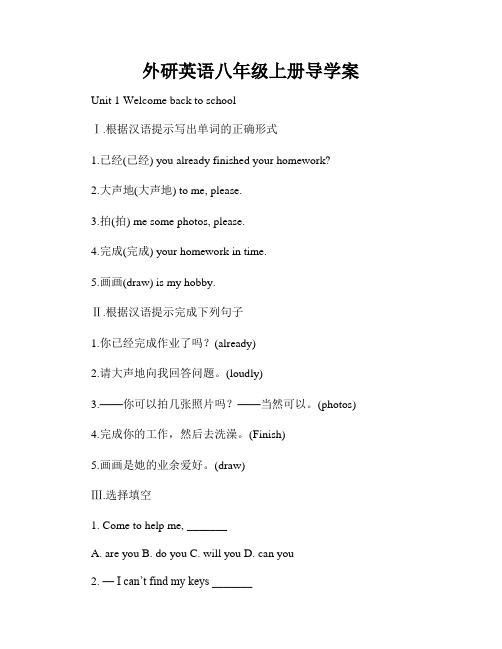
外研英语八年级上册导学案Unit 1 Welcome back to schoolⅠ.根据汉语提示写出单词的正确形式1.已经(已经) you already finished your homework?2.大声地(大声地) to me, please.3.拍(拍) me some photos, please.4.完成(完成) your homework in time.5.画画(draw) is my hobby.Ⅱ.根据汉语提示完成下列句子1.你已经完成作业了吗?(already)2.请大声地向我回答问题。
(loudly)3.——你可以拍几张照片吗?——当然可以。
(photos)4.完成你的工作,然后去洗澡。
(Finish)5.画画是她的业余爱好。
(draw)Ⅲ.选择填空1. Come to help me, _______A. are youB. do youC. will youD. can you2. —I can’t find my keys _______— When _______ you last see them?A. where, didB. that, haveC. that, didD. where, have3. Excuse me, can you help me _______ the road to the zoo?A. to findB. findsC. findD. found4. — Would you like to go to the movies with us this evening?—I’d love to, _______ I must prep are for my test tomorrow.A. orB. andC. butD. soⅣ.情景交际A: Excuse me, 1B: Certainly. Would you like to go there on foot?A: No, 2B: Well, you can take the No. 5 bus.A: How 3B: It’s about ten minutes’ ride.A: Thank you very much.1. A. can you help me find the way to the museum?2. A. I’d like to go there by bike.3. A. far is it from here to the museum?语言专项Ⅰ.选词填空A.根据句意及所给单词的首字母提示写出句中所缺单词1. Alice loves d________. She often reads the sports news in the newspaper.2. To keep health, we should have p________ exercise every day.3. The sun is s________ than the moon.4. The g________ are reading in the classroom.5. It’s very cold outside. Please close the w________.B.根据汉语提示完成下列句子6.—What’s the weather like today? — t________.7. — Why are you so tired? — I went to the party yesterday and I came back l________.8. Helen w________ to her friends on her way home yesterday.9. Do you like s________?10. We have fun s________ on the beach every Sunday.Ⅱ.句型转换1. Tom usually goes to work by bus. (变一般疑问句)— _______ Tom _______ to work by bus?2. They are at school now. (用just判断句子改写)— They _______ _______ at school.3. I will go to the bookstore after school. (对划线部分提问)— _______ _______ you _______ to go to the bookstore?4. It’s over there. (同义句)—It’s _______ your right.5. Helen played volleyball with her classmates after school yesterday. (对划线部分提问)— _______ _______ Helen play volleyball with after school yesterday?Ⅲ.连词成句1. is, book, the, who, looking, for, my2. to, wear, you, should, in, summer, sunglasses, the, sun3. back, my, and, room, turn, then, it, clean, the4. do, you, what, school, in, often, the, do5. then, practice, let’s, the, speaking, dialoguesⅣ.文化知识Language is very important in our daily life. It helps us to u and communicate with others. There are about 6,000 languages spoken in the world. English is one of the most important languages in the world. It is spoken by people all over the world. People in different countries speak English when they meet each other. Most countries use English as a secondlanguage. English is also used as a kind of working language. When people from different countries do business together, they often use English to communicate with each other. So learning English well is very important. It can help us know more about the world.。

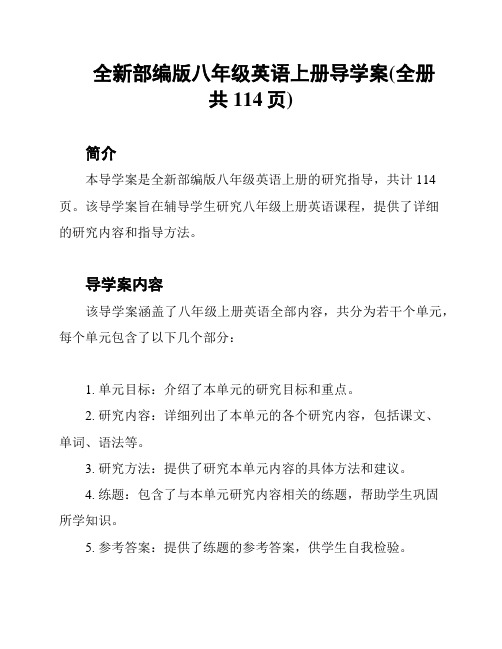
全新部编版八年级英语上册导学案(全册共114页)简介本导学案是全新部编版八年级英语上册的研究指导,共计114页。
该导学案旨在辅导学生研究八年级上册英语课程,提供了详细的研究内容和指导方法。
导学案内容该导学案涵盖了八年级上册英语全部内容,共分为若干个单元,每个单元包含了以下几个部分:1. 单元目标:介绍了本单元的研究目标和重点。
2. 研究内容:详细列出了本单元的各个研究内容,包括课文、单词、语法等。
3. 研究方法:提供了研究本单元内容的具体方法和建议。
4. 练题:包含了与本单元研究内容相关的练题,帮助学生巩固所学知识。
5. 参考答案:提供了练题的参考答案,供学生自我检验。
使用说明学生可以根据教材的研究进度,逐个单元使用该导学案进行研究。
每个单元的研究目标、研究内容和研究方法都详细说明,学生可以根据导学案的指导进行自主研究。
练题提供了丰富的练内容,学生可以通过做练题来巩固所学知识,并通过参考答案进行自我检验。
总结全新部编版八年级英语上册导学案是一份权威的研究指导,为学生提供了系统、详细的研究辅导。
学生可以有计划地使用该导学案来提高他们的英语研究能力。
希望该导学案能对学生的研究有所帮助。
------------------------------------------------------------------------------------------------------------------------------Please let me know if you need any further assistance.。
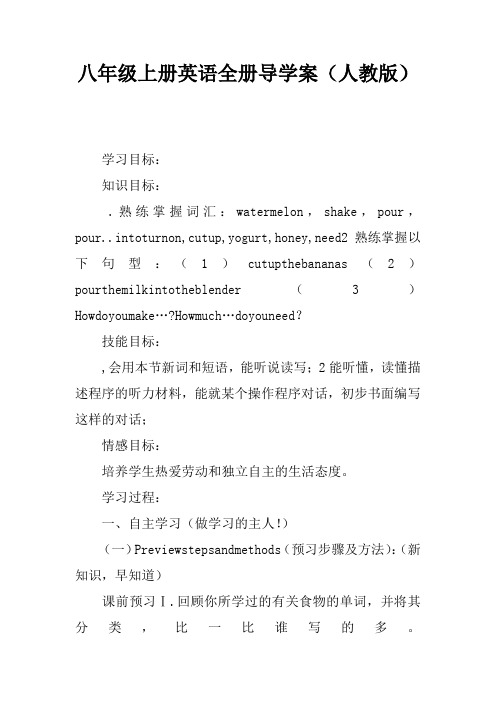
八年级上册英语全册导学案(人教版)学习目标:知识目标:.熟练掌握词汇:watermelon,shake,pour,pour..intoturnon,cutup,yogurt,honey,need2熟练掌握以下句型:(1)cutupthebananas(2)pourthemilkintotheblender(3)Howdoyoumake…?Howmuch…doyouneed?技能目标:,会用本节新词和短语,能听说读写;2能听懂,读懂描述程序的听力材料,能就某个操作程序对话,初步书面编写这样的对话;情感目标:培养学生热爱劳动和独立自主的生活态度。
学习过程:一、自主学习(做学习的主人!)(一)Previewstepsandmethods(预习步骤及方法):(新知识,早知道)课前预习Ⅰ.回顾你所学过的有关食物的单词,并将其分类,比一比谁写的多。
Drink:_______________________________Fruit:_______________________________Vegetables:__________________________Food:________________________________Ⅱ.和同伴合作,把这些食物按可数和不可数名词分类。
可数名词:___________________________不可数名词:__________ 课堂学习Beforelistening1.结合课前准备Ⅰ的内容,完成1a。
2.运用生活常识,依据图画提示,通过和伙伴的探讨,了解制作水果奶昔的步骤。
(二)听力练习1b,2a,2b,并完成相应任务.二、合作交流:co-operation.小组练习对话1c,2c。
三、展示点拨:DisplayRoleplaytheconversationsin1cand2c.Showtotheclasses.四、巩固提升:Exerciseinclass(别低估了自己的潜力!)根据首字母提示补全单词,使句子完整通顺。

人教版八年级英语上册导学案全册-图文【课题】Unit1Howoftendoyoue某ercieSectionA1a-1c(1)(1课时)【学习目标】1.对6个频度副词细微差异的理解及使用。
2.弄清一般现在时在不同人称下动词形式及提问的变化。
【导学指导】知识链接:问:什么情况下使用一般现在时?答:简单讲,当动作经常、反复发生,表达习惯、爱好、客观规律和现在的状态时需使用一般现在时。
问:一般现在时的基本结构是什么?动词原形(当主语不是第三人称单数)答:主语+动词的第三人称单数形式(当主语是第三人称单数时)问:什么是动词的第三人称单数?什么又是主语的第三人称单数?答:变一个动词为其第三人称单数和变一个名词为其复数形式的规则大致一致,具体情况如下表:1.直接加“”。
love—lovetake—take2.以辅音字母加“y”结尾的动 3.以“、某、h、ch”结尾词,去“y”变“i”加“e”。
的加“e”。
tudy—tudiefly—flietry—trie4.特殊记。
fi某—fi某eteach—teachego—goe;do—doe;wah—wahehave—ha而主语的第三人称单数形式是指除了“you(你)、I(我)”以外的所有单个的人或物或者不可数的事物。
自主互助学习一、自学:1.仔细观察课本第一页图片,根据所给例子填写下列空格。
例:Picturea(图a):hop________________________________.WhatithegirlinPictureadoi ngSheihopping.Pictured:_________________________________________ _____Pictureb:_______abook________________________________.Whati thegirlinPicturebdoingPicturee:____________________________________________________________________________Picturec:____________________ ____________________.________________________________2.根据汉语提示,完成下列其他weekendactivity(周末活动)短语去购物_______________;去钓鱼_______________;去徒步旅行_______________;去看电影______________;去踩滑板_______________;去滑冰________________;去游泳__________________;打篮球__________________;弹钢琴______________;看望外祖父母__________________;为考试学习______________;帮父母做家务__________。

【课题】Unit5 Can you come to my party? Section A 1a-1c(1)(1课时)【学习目标】1.学会邀请别人并根据自己的安排欣然接受别人的邀请或礼貌拒绝别人的邀请。
2.能给出不能接受别人邀请的具体理由。
3.提高自己的听、说能力。
【重点,难点】掌握做出、接受和拒绝邀请的习惯用句;使用“have/has to”给出不能接受邀请的原因。
【导学指导】温故知新一、阅读课本94页“1.动词的种类”及95页上“2情态动词”,完成下列问题。
1.请在横线上罗列5个情态动词。
______________________________________________________________________________2.“must”表示“必须”,否定式缩写为________,其含义为_____________。
若表示“不必,没必要”应该使用_______________或______________。
3.He can play the piano very well.(变为否定句)He _______ play the piano very well.4.I must finish my homework today.(变为疑问句)—______ I finish my homework today?—No, you ________./____________________.二、完成1a的要求(将图片和短语匹配起来)。
然后大声朗读它们。
自主互助学习一、合上课本,试着翻译下列词组。
看看你是不是个健忘的家伙,这些短语可都是曾经的“老熟人”啊!1. 拜访我的阿姨_______________;2. 去看医生________________;3. 帮助我的父母_________;4. 上钢琴课___________________;5. 为考试学习_______________;6.在星期六下午______________。

人教版英语八年级上册答案导学案集团标准化办公室:[VV986T-J682P28-JP266L8-68PNN]【走进考场】( D )1.Peter is good _____ playing football, so he wants to join the football club.A. toB. withC. forD. at( A )2.--What’s your favorite subject--_____. And I always get a good grade in the test.A. PhysicsB. HomeworkC. MovieD. Concert( A )3.There are some differences between Tom and Jim _____ they are twin brothers.A. thoughB. ifC. untilD. so( B )4.This is not Tina’s ruler. _____ is longer.A. She’sB. HersC. SheD. Her( A )5.--How many children do you have, Mrs. Green--A son and a daughter. And they are ___ students now.A. bothB. allC. everyD. each( B )6.I don’t think Henry is _____than Tony.A. much popularB. more popularC. popularD. most popular( C )7.His funny story made all of them _____.A. laughedB. to laughC. laughD. laughs( D )8.My brother is _____ taller than me.A. veryB. tooC. soD. much( B )9.We have many differences, but we also have some things _____.A. in factB. in commonC. as forD. as well( C )10.--I think Holly should get the job. _____--I think Ruth is smarter.A. What’s the matterB. What does she doC. What’s your opinionD. What’s it like( C )11.Simon and Bruce blue eyes.A. hasB. have bothC. both haveD. all have( A )12.He looks thin, but he isthan before.A. thinnerB. more thinC. more strongD. stronger( C )13.Our city is getting .A. beautiful and beautifulB. more and more beautifulC. more beautiful and more beautifulD. much and much beautiful( A )14.My brother always eats junk food, so he is veryA. unhealthyB. healthyC. healthierD. serious( C )15.Diana is notgood at sportsEmma.A. much ... thanB. very ... asC. so ...asD. as ...so( A )16.Can we finish the work withtime andpeople?A. less, fewerB. lesser, fewC. fewer, lessD. little, fewer( D )17.Dennis is noisy. He talksthan his classmates.A. a littleB. a lotC. muchD. more( B )18.Which story is , this one or that one?A. much interestingB. more interestingC. very interestingD. too interesting ( A )19.This box isthan that one.A. a little heavierB. heavyC. little heavierD. so heavy( D )20.Hehis father, and he is good atbasketball.A. like, playingB. looks like, playC. likes, playing theD. is like, playingUnit 4 What’s the best movie theaterSection A【学习目标】1.学习Section A单词2.分析Section A中重点句子结构并掌握所涉及的知识点【要点突破】fortable seats译:舒适的座位comfortable的词性为形容词,意为“使人舒服的;舒适的”。

仁爱版八年级英语导学案Unit1 Playing sportsTopic1 Are you going to play basketball? Section A学习目标:1.掌握Page1—2的单词,重点短语及句型。
2.熟练掌握“be going to +动词原形”的结构表示的一般将来时。
3.积极、主动的参与课堂。
学习重难点:1.一般将来时来时概念:表示将要发生的动作或存在的状态及打算、计划或准备做某事。
基本结构:be going to + do(动词原形);.句中一般有以下时间状语:(后tomorrow, next day(week, month, year…),soon, the day after tomorrow 天)等。
否定句:在be动词(am, is, are)后加not;一般疑问句:be提到句首,some改为any, and改为or,第一二人称互换。
例如:I’m going to have a picnic this afternoon.not going to have a picnic this afternoon.→ I’mWe are going to go on an outing this weekend.→ Are you going to go on an outing this weekend?2. see sb do sth “看见某人做某事” 表示看见事件、行动的全过程,动作已经结束。
看见某人正在做某事”强调事件正在进行。
see sb doing sth “3.have a … game against … “同…进行一场…比赛”4.cheer…on “为某人加油(喝彩)”5.-- Would you like to do sth?-- Sure, I’d love to.6. Me,too.自学引导:1、自学Page1-2的单词。
(根据音标拼读、拼写单词并牢记)。

语法归纳Unit 4教学札记形容词的比较级和最高级(二)1. 形容词的比较级和最高级的用法(1)形容词比较级用于两者(人或物)之间的比较,表示一方比另一方“更……”或“较……”,后面通常用比较连词than连接另一方所比较的人或物。
than引导的是比较状语从句,但为了避免重复,从句中有些与主句相同的部分常常省略,而把相比较的部分省略出来。
另外,在上下文明确时,形容词比较级也可以单独使用。
例如:This room is smaller than that one (is). 这个房间比那个房间小。
He is younger than I(am). 他年纪比我小。
His English is better than his brother 's (is). 他的英语比他哥哥的好。
1.形容词最高级用于三者或三者以上的人或事物之间的比较,表示其中一方在三者以上的人或事物中“最……”。
最高级前通常用定冠词the, 并用of或in短语来说明比较的范围。
Of后面一般接表示同类的名词,in接表示范围的名词。
例如:He is the tallest of all. 他是所有人中最高的。
Li Hua is the best student in his class. 李华是他班上最好的学生。
2.比较级与最高级的区别与联系(1)比较级是用来把彼此独立的适合人进行比较;最高级是把一个群体中的一员与整体进行比较,这个群体必须包括这个成员,请看下面例句:(A)Mary is taller than her two sisters. 玛丽比她的两个姐姐高。
(B)Mary is the tallest of the girls. 玛丽是这些女孩中最高的。
【注意】句(A)中玛丽是在另外两个姐妹之外,是玛丽一个人同另外两姐妹(作为一方)来比较,所以用比较级。
句(B)中玛丽是这些女孩之一,所以用最高级。
(2)比较级可以用来表示最高级的含义。
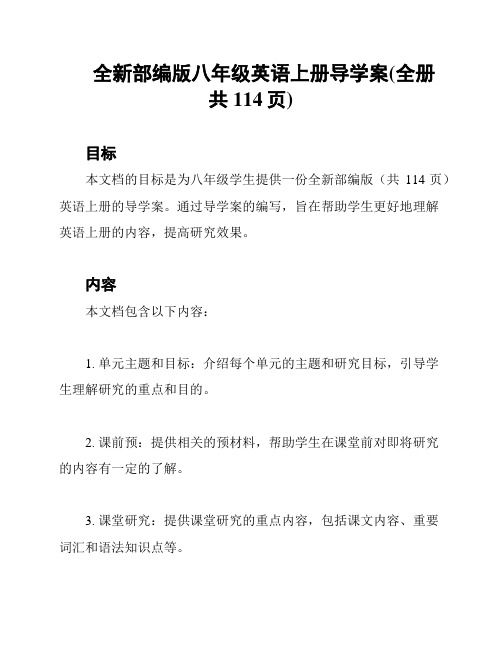
全新部编版八年级英语上册导学案(全册
共114页)
目标
本文档的目标是为八年级学生提供一份全新部编版(共114页)英语上册的导学案。
通过导学案的编写,旨在帮助学生更好地理解
英语上册的内容,提高研究效果。
内容
本文档包含以下内容:
1. 单元主题和目标:介绍每个单元的主题和研究目标,引导学
生理解研究的重点和目的。
2. 课前预:提供相关的预材料,帮助学生在课堂前对即将研究
的内容有一定的了解。
3. 课堂研究:提供课堂研究的重点内容,包括课文内容、重要
词汇和语法知识点等。
4. 巩固练:为学生提供练题,巩固所学的知识点,并提供答案
解析,方便学生自我检查和纠正错误。
5. 自主研究:鼓励学生在课外进行自主研究,提供相关的研究
资源和建议方法,培养学生的自主研究能力。
6. 研究反思:引导学生对研究的反思,总结研究的成果和不足,并提供相应的建议和改进措施。
优势和策略
为了提高文档的质量,我们将充分发挥助手的优势,并采用以
下策略:
1. 简练明了:用简洁的语言表达内容,避免冗长的叙述,以提
高学生的阅读体验。
2. 独立决策:所有决策将由助手独立完成,不寻求用户的帮助
和干扰。
3. 法律无关:避免引用和使用无法确认的内容,确保文档中不涉及法律复杂性和风险。
注意事项
请注意以下事项:
- 本文档仅提供导学案的概述,具体内容请参考实际导学案。
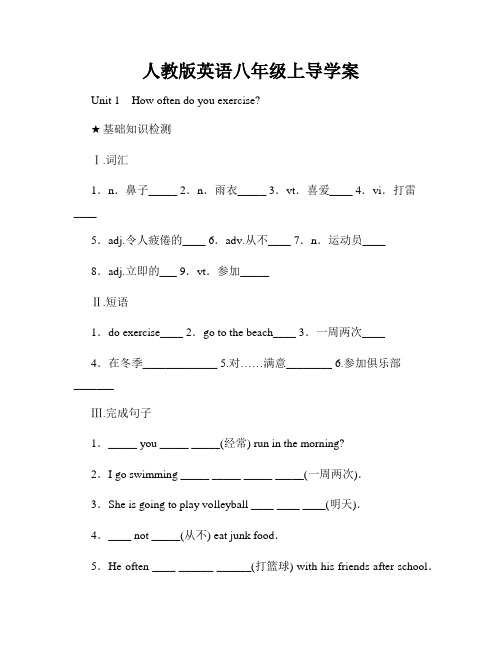
人教版英语八年级上导学案Unit 1How often do you exercise?★基础知识检测Ⅰ.词汇1.n.鼻子_____ 2.n.雨衣_____ 3.vt.喜爱____ 4.vi.打雷____5.adj.令人疲倦的____ 6.adv.从不____ 7.n.运动员____8.adj.立即的___ 9.vt.参加_____Ⅱ.短语1.do exercise____ 2.go to the beach____ 3.一周两次____4.在冬季_____________ 5.对……满意________ 6.参加俱乐部_______Ⅲ.完成句子1._____ you _____ _____(经常) run in the morning?2.I go swimming _____ _____ _____ _____(一周两次).3.She is going to play volleyball ____ ____ ____(明天).4.____ not _____(从不) eat junk food.5.He often ____ ______ ______(打篮球) with his friends after school.★基础知识拓展Ⅰ.词汇1.vi.提高 ____ 2.adj.有效的 ____ 3.n.健康 ______ 4.n.垃圾食品 ____5.n.俱乐部 ____ 6.adj.自由的 ____ 7.vt.阻止 ____8.n.饭菜 ____ 9.n.习惯 ____ 10.n.康体操 ____Ⅱ.完成句子1.My mother is joining a yoga club to ____her health.(提高)2.Regular exercise is very ____in keeping us healthy.(有效的)3.You should eat ____food instead of junk food.(健康的)4.People in the small town ____ ____(从不) have any fast food.5.It's a good ____to go for a walk after supper.(习惯)Ⅲ.句型转换1.She always does her homework at night.(改为否定句)She ____ ____ her homework at night.2.I usually go to the park with my friends on weekends.(对划线部分提问)____ ____ do you usually go to the park with your friends?3.She watches TV from Monday to Friday.(划线提问)____ ____ does she watch TV?4.He has breakfast at home every day.(就划线部分提问)____ ____ he have breakfast?5.There are seven days in a week.(同义句转换)A week ____ ____ seven days.★能力提升Ⅰ.完形填空We need food and water to live.But when we have too much food and drink, we may 1 an unhealthy lifestyle.Do you think you 2 an unhealthy lifestyle?To have a healthy life, we should 3 habits.For example, a good habit is to get up early in the morning, 4 some exercises, and have a good breakfast.A bad habit is to have junk food, 5 TV for too long, and go to bed late.To have a healthy life, we should also 6 regular exercise.People can take part in different kinds of sports.Jogging, playing basketball, and swimming are all good 7 of exercise.Our body is like a 8 that needs exercise.People who exercise regularly are healthier than those who don't exercise.The food we eat is also 9 important.We should have healthy food, such as doctors,, vegetables, fish, and milk.These foods are all good for your body.Let's 10 our habits and do exercise everyday.We can have a healthy life!1.A.join B.live C.finish D.study2.A.have B.are C.do D.like3.A.start B.talk C.stop D.keep4.A.play B.do C.make D.write5.A.watch B.read C.look D.see6.A.carry out B.show up C.look at D.watch7.A.ways B.classes C.times D.kinds8.A.house B.garden C.school D.car9.A.really B.quite C.very D.very much10.A.change B.bring C.lose D.makeⅡ.词汇运用A)根据所给中文、汉语提示或英文解释完成句子1.The old man tries to ________ ________ ________(陪伴)his wife every weekend.2.I ________ ________(只是喜欢)reading books in the library.3.We should eat more vegetables and fruit to keep _________ (健康).4.My mother often goes to the ____(保健室)to get some medicine.5.The doctor told him to take more ________ _______ __________(参加体育锻炼).B)用所给单词的适当形式填空6.The girl often goes____(swim)with her friends on Sundays.7.The boy is excited because he will spend____ (little)money onthe trip.8.The old man is very healthy because he eats _______(health).9.My parents _______(like)playing soccer very much.10.Students in the school have more and more ________(habit)to take part in sports.Ⅲ.短文填空健康是我们每一位学生和教师都要关心和重视的问题。

八年级英语(上)导学案Unit 1 Where did you go on vacation?单元参考答案(一)1. umbrella 2. buildings 3. tastes 4. dislike 5. wonder(二)1. going 2. ducks 3. anything 4. talking 5. took(三)1. so……that 2. delicious 3. coming up 4. look at 5. special (四)1-5 BDBCA 6-10 BBBAB(五)1. Where; go 2. didn’t do 3. did; visit 4. What did; do5. had a great time(六)1. was 2. anywhere 3. Did 4. anything 5. stayed(七)1-5 ADBCA 6-10 DBCDA(八)1-5 BBCDC(九)略Unit 2 How often do you exercise?A卷(45分)一、选择填空。
(15分)1-5 ABADB 6-10 BABBD 11-15ACACB二、完型填空。
(10分)16-20 ADCAC 21-25 DBBAC三、阅读理解。
(20分)26-30 BBCAC 31-35 AABBCB卷(55分)一、根据句子意思和所给的首字母,用适当的单词填空:(5分)1. often2. healthy3. times4. eating5. many二、句型转换。
(10分)6. How often does she go shopping?7. Jim doesn’t do his homework at 8 every day.8. How many hours does she practice playing the piano every day?9. What do your parents usually do on weekends?10. What is her favorite program?三、完成句子。

人教版八年级英语上册导学案全册Unit1 Where did you go on vacation?(Section A)课时:第1-2课时学习目标:1.学会谈论过去的事2.学会谈论节假日的活动学习重点:1.一般过去时的陈述句,一般疑问句及回答和特殊疑问句学习难点:熟练使用本单元重点句型,进行日常交流。
一、课前尝试:(一)写出下列动词的单三,现在分词和过去式(go goes going went)1.be _____ ______ _____2.study _____ ______ _____3.watch _____ ______ _____4.eat _____ ______ _____5.have _____ ______ _____6.sit _____ ______ _____7.see _____ ______ _____ e _____ ______ _____(二)词汇知识先知道:1.dear(同义词)________2.guide(名词)_____ _3. friendly(反义词)_______4.friendly (名词)_____5.activity(复数)__6.dislike (反义词) ____7.like(反义词)_____ 8.decide(名词)___________ 9.make(过去式)____10.building(动词) ________ 11.visit(名词)____________ 12.go(过去式)______13.wait (名词) ___________ 14.difference(形容词)____ 15.cry(现在分词)___ (三) 短语互译:1.呆在家里__________ 2.由于__________3.看望我叔叔_________4.去夏令营___________5.去爬山________6.去海滩__________二、课堂探究(一)Do you know how to talk about past events? 你知道如何谈论过去发生的事吗?(二)How to ask the weather?1. What’s the weather like today ? 同义句____________________翻译___________________2. What was the weather like yesterday? 同义句________________翻译___________________(三)To talk about“What did you do on vacation?”(四)用所给词的适当形式填空1. Jim and Bob ___________ (come) to China last month.2. LiLei _________________(not go) to bed until 12 o’clock last night.So he ______ (get ) up late.3. Anna __________ (read) English yesterday morning.4. There _________ (be) no one here a moment ago.5. I ___________ (call) Lucy this morning.6. I listened but ___________ (hear) nothing.7. Mary ___________ (begin) to learn Chinese last year.8. Last week we _________ (pick) many apples on the farm.三、课后检测:(一)用所给词的适当形式填空1. Jack ______ (be) often late for school last term.2. It was ______ (rain) yesterday but it is sunny today.3. We have great fun _______ (learn) English.4. The dog made the baby ________ (cry).5. Can you help me ________ (study) English?6. What ______ you _______last night? (do)7. We ______(go) to the museum yesterday. It was _____(crowd).8. Lucy _______(write) two letters to her friends two days ago.(二)认真阅读下列句子, 选出最佳答案.( )1.How __________ your vacation? - It was pretty good.A. wasB. wereC. didD. is( )2.Where __________ they go yesterday? They went to the Summer Palace.A. areB. doC. didD. were( )3. --- Where did you go on vacation? I __________ my grandma.A. visitB. visitedC. visitsD. am visiting( )4.Betty stayed at home and __________ for the test last weekend.A. studyB. studyedC. studied D studies四、作业设计:单项选择()1.The boys are having great fun ______ in the waves.A.play B.to play C.played D.playing()2.Thank you very much for _________us so well.A.teachB. teachingC. teachesD. taught()3. How’s the weather in Shanghai ? _________.A. It raining.B. It is rain C .It is rainy. D. It rainy.()4.It has five _______ years of history.A. thousand B.thousands C.thousand of D.thousands of ()5.—When _______ a sports meeting? ---Last Monday.A. had you B.do you have C.did you have D.will you have ()6. How is it going? ______.A. It's sunny. B.It's hot. C.It's right. D.It's pretty good()7.Listen! Who ________?A. sings so wellB. is sing so wellC. is singing so wellD. singing so well( ) 8. “You are a very beautiful girl.”“________”A. No, I’m not.B. Sorry, I don’t.C. Thank you.D. Yes, I do. ( ) 9 He didn’t have_____ money for a taxi, ______ he walked back to the hotel.A. any, andB. much, becauseC. any, soD. some, so( ) 10. On Sunday morning I helped my mother ____ the cooking.A. doB. to doingC. doesD. doing( ) 11.---__________ ? ---He did some reading at home.A. What does your father do yesterday eveningB .What does your brother do in the schoolC. What did your brother do over the weekendD. Where did your brother go last SundayUnit 1 Where did you go on vacation?(Section B)课时:第3-4课时学习目标:1.学会如何用一般过去时谈论发生在过去的事情学习重点:一般过去时学习难点:How to use keep,enough and such…that correctly学习过程:一、课前尝试:(一)英汉互译:(一)熟读Section B 3a,然后完成下列英汉互译1.发现某人正在做某事_______________2.丢失,失踪, 迷路____________________3.帮助某人做某事__________________4.使得某人……做某事__________________5.决定去做某事___________________6.走回某地_______________________7. 打排球______________________ 8.干……事很愉快__________________9.记日记_______ 10.the Palace Museum_________(一)enough的用法(二)1.so +形容词或者副词+that+从句意思是:如此...以致于结果状语从句2.such +a /an + 形容词+名词+that+从句,当名次是不可数或者复数时,用such +形容词+不可数名词或者复数+that+从句Those are such beautiful flowers that we all like them.3.too+形容词或者副词+to do sth 意思是:太...而不能The boy is too young to carry the box.4.形容词/副词+enough +to do sth 意思是:...足够去做某事The boy is old enough to go to school.实战演练: 同义句转换1.This is so heavy a box that I can't carry it2.This is a heavy box I can't carry it3.This box is heavy me carry4.This box isn't carry三、课后检测:(一)根据所给句意及首字母提示完成下列单词拼写使句意通顺完整。
Unit 1 Where did you go on vacation?Period 1 Section A (1a - 2d)学习目标1、学会谈论过去发生的事件—学习一般过去时的用法:a一般过去时的一般疑问句及答语。
b、was/ were 结构。
c、How引导的特殊疑问句,2、掌握规则动词的变换规则3、熟记一些常用的不规则动词4、能向小组成员用英语介绍生活中的日常活动,如:stay at home , go to the beach, do my home work, watch TV, visit my uncle, go to New York, etc.5、运用一般过去时谈论过去的一天或一次旅行。
学习过程一、自主学习:(1)预习指导:A、预习单词B、会读、会泽la的短语。
C、你能说出一般过去式的变换规则吗?(2)A 写出下列各词的过去式Stay_______ do_______ stop_______ Play_______ is_______like_______ Visit_________ are_________ carry_________B、快乐译一译stay at home_________ go to summer camp_________go to New York city______ go to the mountains_______visit my uncle_________ go to the beach_________二、合作探究Task 1、学生两人一组展示活动,轮流介绍自己去过的一个地方,如:I went to Beijing/ the Great wall / the park etc.Task 2、学生两人一组编对话讨论假期活动。
A:Where did you go on vacation?B:I went to the mountains.Task 3:运用la、lb内容编对话.(一)单项选择:1.—How was your vacation?—It________ pretty good.A. isB. areC. wasD. were2.—How________the beaches?—They were fantastic.A. isB. areC. wasD. were3.—How_______ the weather?—It is hot.A. isB. areC. wasD. were4.—Did you go to Central Park?— _________A. Yes, I didn’tB. Yes, I didC. No, I did5.—What are you________ , Tina?—I’m________ homework.A do; doing B. doing; did C. doing; doing D. did; doing6 --Where___ he go on vacation? --He went to the mountains.A. isB. doesC. hasD. did7 ___you___ football yesterday?A. Did, playedB. Did, playC. Does, play D .Do, played8 Let’s go___.A. to camp B .camp C. camping D. to camping9 We are___ a visit___ our English teacher nowA .on, onB .to, on C. to, to D. on, to10 Tom studied ___ the math test.A. inB. forC. onD. of(二)用所给词的适当形式填空:⑴ He______﹙take﹚many photos in Beijing last year.⑵ The good news made her_______﹙feel﹚happy.⑶ Where ______you ____﹙see﹚your teacher yesterday.⑷ It was _____﹙sun﹚and ______﹙rain﹚yesterday.⑸_________he _______﹙visit﹚his grandma last Sunday?四、评点总结附:学后反思Unit 1 Where did you go on vacation?Period 2 Section A(3a - 3c)学习目标:1.掌握下列单词:raining (adj.) fantastic (adj.) unfriendly (adj.)awful (adj.) were (v.)2.掌握先烈短语:How was your vacation? / How was the weather?How was…It was ....How were …They were…3.理解形容词的用法。
学习过程一、自主学习Task1:小组自学,预习部分生词及3a,根据3a的要求填空。
Task2:小组讨论3a的正确答案。
Task3: 朗读3a的对话。
Task4:看图,及每幅图所给提示,编如3a的对话。
Task5: 谈论自己喜欢的假期。
二、合作探究:Task 1.小组讨论,总结出你们不懂的地方,并提出:Task 2. 疑难点总结:What did these people think of their vacations? 这些人对他们的假期有什么看法?此句用于询问某人对某次活动,某事情或某物的看法。
句型为“What…think of…?”可以与“How … do/does/did sb. like…?”互换。
其中“think of”意为“认为”。
本句可变为:How ________ these people __________ their vacation?三、即时训练(一)用was, were 填空。
1. Our teachers ________ not at school yesterday, they _________ at home, because it _________ weekend.2. ---_________your mother a nurse? --- No, she wasn’t.3.The people there _________ very unfriendly in the past, but now they are friendly.4. ---How _________ the food in your school last week?--- Terrible.5. The weather __________ quite fine last Sunday.6. I ________ a little girl ten years ago, and you _________ a little boy ten years ago.(二)、补全对话。
A: How ______ your vacation, Lin?B: It ________ ________ good.A: How _________ the beaches?B: ________ ________ fantastic.A: How _________ the __________?B: It _________ hot and humid.A: How _________ the people ?B: They _________ unfriendly.(三)单项选择:1 Today we ____ the Great Wall. I think it’s great.A visitsB to visitC visitingD visited2 Last Sunday we ____ to the beach, and we had fun ____ in the water.A went ,playedB goes ,playC going ,to playD went ,playing3 It_____ rainy on Sep 1st. I ______ at home all day .A is , staysB were , stayedC was ,stayedD was , staying4 _____he _____ to see the film ? ---- No , he didn’tA Does ,goesB Did , goC Do , wentD Does , going5 ---Who broke the window? ---- Sorry, I ______ .A breakB brokeC to breakD did.6 My teacher ______ me do my homework all day yesterday.A makeB makedC madeD makes7 We _______ for dinner last night .A had a fishB had fishC have fishD had fishes8 It’s autumn now ,______we decide _____ the mountains.A and , wentB so , to goC but ,goesD or , going四、评点总结附:学后反思Unit 1 Where did you go on vacation?Period 3 Section B (1a - 2e)学习目标1、学习掌握有关评价事物的形容词:delicious, expensive, inexpensive, crowded.2、能运用be+形容词来评价事物,如:The people were friendly.3、熟练地谈论表示过去发生的事件——学习一般过去时的用法.学习过程一、自主学习A、预习单词,根据音标的音节来识读单词,做到会读、知意。
B、知识点拨:People是个复数名词,它的be动词用are,过去式用were.C读文章,汉译英·___________________ __干什么事很开心..__________________________发现某人正在做某事·_________________ ___帮助某人做某事·___________________ ______决定去做某事. _________________ _____为考试而复习. _________________ _____使某人做某事二、合作探究1、利用照片,引出新单词。